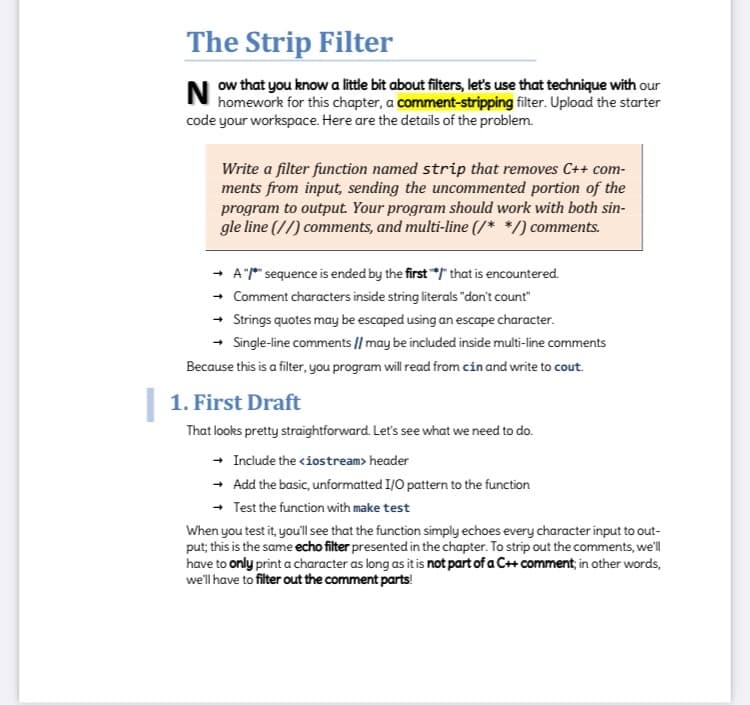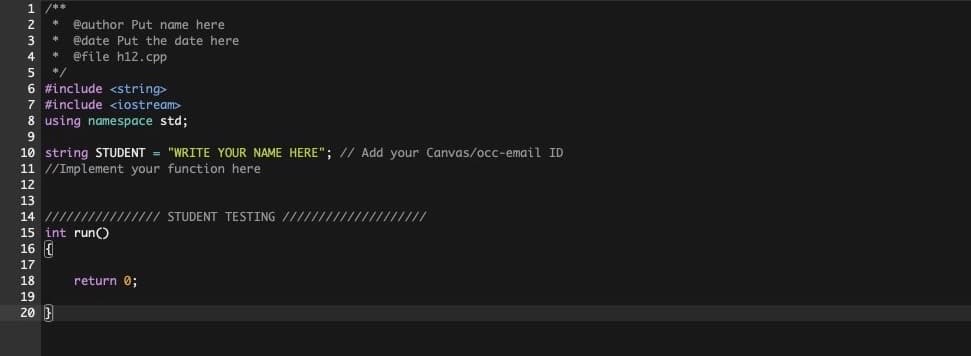The Strip Filter ow that you know a little bit about filters, let's use that technique with our N homework for this chapter, a comment-stripping filter. Upload the starter code your workspace. Here are the details of the problem. Write a filter function named strip that removes C++ com- ments from input, sending the uncommented portion of the program to output. Your program should work with both sin- gle line (//) comments, and multi-line (/* */) comments. - A"/" sequence is ended by the first "r that is encountered. - Comment characters inside string literals "don't count" - Strings quotes may be escaped using an escape character. Single-line comments || may be included inside multi-line comments Because this is a filter, you program will read from cin and write to cout. 1. First Draft That looks pretty straightforward. Let's see what we need to do. - Include the header - Add the basic, unformatted I/O pattern to the function - Test the function with make test When you test it, you'll see that the function simply echoes every character input to out- put; this is the same echo filter presented in the chapter. To strip out the comments, we'll have to only print a character as long as it is not part of a C++ comment, in other words, we'll have to filter out the comment parts!
The Strip Filter ow that you know a little bit about filters, let's use that technique with our N homework for this chapter, a comment-stripping filter. Upload the starter code your workspace. Here are the details of the problem. Write a filter function named strip that removes C++ com- ments from input, sending the uncommented portion of the program to output. Your program should work with both sin- gle line (//) comments, and multi-line (/* */) comments. - A"/" sequence is ended by the first "r that is encountered. - Comment characters inside string literals "don't count" - Strings quotes may be escaped using an escape character. Single-line comments || may be included inside multi-line comments Because this is a filter, you program will read from cin and write to cout. 1. First Draft That looks pretty straightforward. Let's see what we need to do. - Include the header - Add the basic, unformatted I/O pattern to the function - Test the function with make test When you test it, you'll see that the function simply echoes every character input to out- put; this is the same echo filter presented in the chapter. To strip out the comments, we'll have to only print a character as long as it is not part of a C++ comment, in other words, we'll have to filter out the comment parts!
Database System Concepts
7th Edition
ISBN:9780078022159
Author:Abraham Silberschatz Professor, Henry F. Korth, S. Sudarshan
Publisher:Abraham Silberschatz Professor, Henry F. Korth, S. Sudarshan
Chapter1: Introduction
Section: Chapter Questions
Problem 1PE
Related questions
Question
Please answer in C++

Transcribed Image Text:The Strip Filter
N ow that you know a little bit about filters, let's use that technique with our
homework for this chapter, a comment-stripping filter. Upload the starter
code your workspace. Here are the details of the problem.
Write a filter function named strip that removes C++ com-
ments from input, sending the uncommented portion of the
program to output. Your program should work with both sin-
gle line (//) comments, and multi-line (/* */) comments.
A"* sequence is ended by the first " that is encountered.
+ Comment characters inside string literals "don't count"
+ Strings quotes may be escaped using an escape character.
Single-line comments || may be included inside multi-line comments
Because this is a filter, you program will read from cin and write to cout.
| 1. First Draft
That looks pretty straightforward. Let's see what we need to do.
- Include the <iostream> header
- Add the basic, unformatted I/O pattern to the function
- Test the function with make test
When you test it, you'll see that the function simply echoes every character input to out-
put; this is the same echo filter presented in the chapter. To strip out the comments, we'll
have to only print a character as long as it is not part of a C++ comment; in other words,
we'l have to filter out the comment parts!

Transcribed Image Text:2
@author Put name here
* @date Put the date here
@file h12.cpp
*/
6 #include <string>
7 #include <iostream>
8 using namespace std;
10 string STUDENT = "WRITE YOUR NAME HERE"; // Add your Canvas/occ-email ID
11 //Implement your function here
12
13
ST
14 /////////I////// STUDENT TESTING ///
15 int runO
16 {
17
18
return 0;
19
20 }
Expert Solution
This question has been solved!
Explore an expertly crafted, step-by-step solution for a thorough understanding of key concepts.
This is a popular solution!
Trending now
This is a popular solution!
Step by step
Solved in 4 steps with 4 images

Recommended textbooks for you

Database System Concepts
Computer Science
ISBN:
9780078022159
Author:
Abraham Silberschatz Professor, Henry F. Korth, S. Sudarshan
Publisher:
McGraw-Hill Education

Starting Out with Python (4th Edition)
Computer Science
ISBN:
9780134444321
Author:
Tony Gaddis
Publisher:
PEARSON

Digital Fundamentals (11th Edition)
Computer Science
ISBN:
9780132737968
Author:
Thomas L. Floyd
Publisher:
PEARSON

Database System Concepts
Computer Science
ISBN:
9780078022159
Author:
Abraham Silberschatz Professor, Henry F. Korth, S. Sudarshan
Publisher:
McGraw-Hill Education

Starting Out with Python (4th Edition)
Computer Science
ISBN:
9780134444321
Author:
Tony Gaddis
Publisher:
PEARSON

Digital Fundamentals (11th Edition)
Computer Science
ISBN:
9780132737968
Author:
Thomas L. Floyd
Publisher:
PEARSON

C How to Program (8th Edition)
Computer Science
ISBN:
9780133976892
Author:
Paul J. Deitel, Harvey Deitel
Publisher:
PEARSON

Database Systems: Design, Implementation, & Manag…
Computer Science
ISBN:
9781337627900
Author:
Carlos Coronel, Steven Morris
Publisher:
Cengage Learning

Programmable Logic Controllers
Computer Science
ISBN:
9780073373843
Author:
Frank D. Petruzella
Publisher:
McGraw-Hill Education